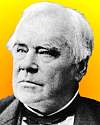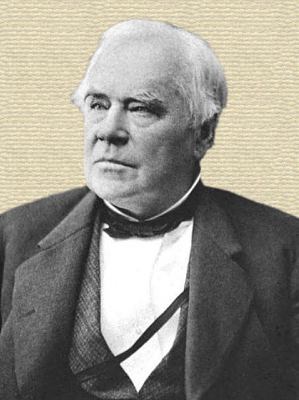 (source)
(source)
|
James Bicheno Francis
(18 May 1815 - 18 Sep 1892)
British-American engineer who originated the scientific method of testing hydraulic machinery.
|
MEMOIRS OF DECEASED MEMBERS.
James Bicheno Francis.
Past President and Honorary Member*
Died September 18th, 1892.
from Transactions of the American Society of Civil Engineers (1893)
[p.74] James Bicheno Francis was born at Southleigh, Oxfordshire, Eng., on May 18th, 1815. In 1829 he became assistant to his father, then Superintendent of the Duffrynllyn and Port Cawl Railway and Harbor, South Wales. In 1831 he was employed on the Great Western Canal in Devonshire and Somersetshire.
The extended railway operation then projected in America drew his attention to this country in 1833, and on April 11th of that year he landed in New York, to seek employment in the New World. He [p.75] applied to Mr. Whistler, who, with Major W. Gibbs McNeill, were then the most prominent engineers in this country, and appeared to so good advantage that he was at once assigned a position on the Stonington and Providence Railway (New York, Providence and Boston Railroad), the construction of which had been commenced under James P. Kirkwood as Resident Engineer.
In 1826 the proprietors of Locks and Canals, Lowell, Mass., had established a machine shop for the construction of general mill machinery, to which they added the construction of locomotive engines in 1834, and secured the services of Mr. Whistler to take charge of it, as engineer. Mr. Francis accompanied Mr. Whistler to Lowell from Stonington, and remained as his assistant until Mr. Whistler left in 1837, when Mr. Francis, at the age of twenty-two, was made engineer of the Locks and Canals Company, which position he held for 48 years.
In 1845 the proprietors of Locks and Canals gave evidence of their high appreciation of Mr. Francis’ eminent ability and usefulness by appointing him their agent as well as engineer, with increased salary, and for the following 40 years, with full powers conferred upon him, he had the direction and management of the entire water-power, with the designing and construction of the numerous improvements which have resulted in establishing Lowell as the first manufacturing center in our country.
He was the recognized consulting engineer to all the various manufacturing corporations who derived their powers from the Merrimac River at Lowell.
In 1846 he designed the enlargement of the water-power at Lowell by the construction of the Northern Canal, where he introduced the method of operating the head gates by means of screws, the nuts being driven by turbines. As a canal for water-power, it is of unusually large proportions and of permanent construction, with solid timbers, head gates in granite ashlar, a river wall of the same, and side walls of rubble.
A reference to this improvement would be incomplete without mention of the provision which Mr. Francis made to meet the possibility of the highest freshet. He concluded that the lock gates of the old canal, which had been there since the inception of Lowell, were not high enough to serve as dam against such a freshet as had occurred more than half a century ago. He therefore carried up the side walls of the lock high above canal traffic, with grooves extending to its floor, and hung in these grooves a timber gate, 27 ft. wide by 25 ft. deep, by an iron strap.
Two years later, in April, 1852, there came a freshet, when it became necessary to lower this gate, and thus save the canal works, the mills and a large part of the city, an immense amount of property and [p.76] possibly many lives, from a torrent which would have swept everything in its course to destruction.
It was a little curious to see, in a country of almost annual floods, that the great freshet had waited 67 years, until Mr. Francis had the sagacity to provide for its reception. The citizens were not slow to appreciate this service by presenting Mr. Francis with a service of plate.
Another of his works at Lowell was the reconstruction of the Pawtucket Dam across the Merrimac River, and the skillful application of hydraulic lifts to the great gates of the Pawtucket Canal.
A large part of Mr. Francis’ duty at Lowell was in the distribution of the water-power, and in the determination of its value, among the several corporations, in accordance with their respective rights. This has called for the execution of extended experiments on a large scale during many years, selections from which were first published in 1855, entitled, “Lowell Hydraulic Experiments.” This embraced experiments on hydraulic motors and on the flow of water over weirs and in short canals. A subsequent edition has added much important matter, the result of further experiments, embracing flow of water through submerged orifices and diverging tubes.
This work forms an era in the literature of hydraulic engineering, and is recognized as of standard authority, the experiments having been conducted on a scale and with an accuracy of detail and record hitherto unprecedented; and whatever may hereafter be effected towards the evolution of reliable hydraulic formula will derive much of its value from a recognition of the principles and methods pursued by Mr. Francis in conducting these experiments, which were not undertaken as a purely elementary problem in hydraulic science, but, as before stated, grew out of the necessity for a practicable determination of the amount of water distributed to the various mills in their daily operation under every possible contingency of flow.
In 1844 Mr. Francis was elected a Fellow of the American Academy of Arts and Sciences.
In 1852, elected Member of the American Society of Civil Engineers at their first meeting, elected President for 1881, and Honorary Member April 5th, 1892; became a member of the Boston Society of Civil Engineers, July, 1848, and its President in 1874.
In 1851 he received from Dartmouth College the honorary degree of Master of Arts, and the same degree was conferred by Harvard University in 1858.
He was a Member of the American Philosophical Society of Philadelphia, and member of the Boston Society of Natural History; honorary member of Manchester Historical and Genealogical Society, Trinity Historical Society of Dallas, Texas, and the American Society of Irrigation Engineers of Utah.
Mr. Francis was so well known as standing at the head of his [p.77] profession of hydraulic engineering that he had a wide practice as Consulting Engineer throughout the country. Among the more important works upon which he was called to advise were some 50 waterpower establishments in nine States and two provinces; also, water works in 18 cities of five States and provinces ; also, many foundations of important structures and irrigation works in California.
Mr. Francis resigned the office of agent and engineer of the Locks and Canals, Lowell, in 1885; this was 50 years after he entered the service of the Company, and his friends of the second generation of directors, on presenting him with a fine service of silver, added to their expressions of trust and friendship, the declaration, ‘‘that to the eminent ability and wisdom which have distinguished your administration, the marked success of the Lowell manufacturers has been largely due.” He was then appointed Consulting Engineer of the company, which position he held at the time of his death, September 18th, 1892.
While in the line of his profession, as we have seen, he so identified himself with the material progress and improvement of his adopted home as to make his life an era in the history of the first manufacturing center of our country, he yet was ready at all times, through his kindly disposition, to contribute his services whenever required, either in private charity or in a more public but equally unremunerative line of personal effort, and thus filled many positions of trust and honor in the service of his townsmen in the City Council, and in the State Legislature. Sound judgment, sterling integrity, and the reputation which he early acquired of seeking the truth for its own sake in whatever investigation he might be charged with, led to his counsel being sought in many and varied lines of professional enterprise throughout the country; and his reports, characteristically clear and concise, which have fortunately been preserved, of much of his interesting practice as a consulting engineer, will prove of great value to his professional brethren who may have occasion to consult them. …, and they will be so placed as to be accessible to the Members of the Society.
Mr. Francis was an exemplary Christian gentleman, of most unassuming manner, high intelligence, a resolute will, of cheerful temperament, a pure heart, and a quiet sense of humor which showed in his countenance A well-balanced mind and clear judgment were his marked characteristics. His work in the world added to the knowledge of the learned, the wealth of the producer, and the comfort of the masses.
He illumined his high profession, made those near to him happy, and left the world the better for having lived in it, and the serene fortitude with which he faced death was but the logical end of his career. Mr. Francis was married to the daughter of the late George Brownell, of Lowell, who, with four children, survive him. His second son, Col. James Francis, succeeded his father as agent of the Locks and Canals when the latter retired in 1884.
- 18 May - short biography, births, deaths and events on date of Francis's birth.
- James Bicheno Francis Obituary - from Proceedings of the American Academy of Arts and Sciences (1893).





